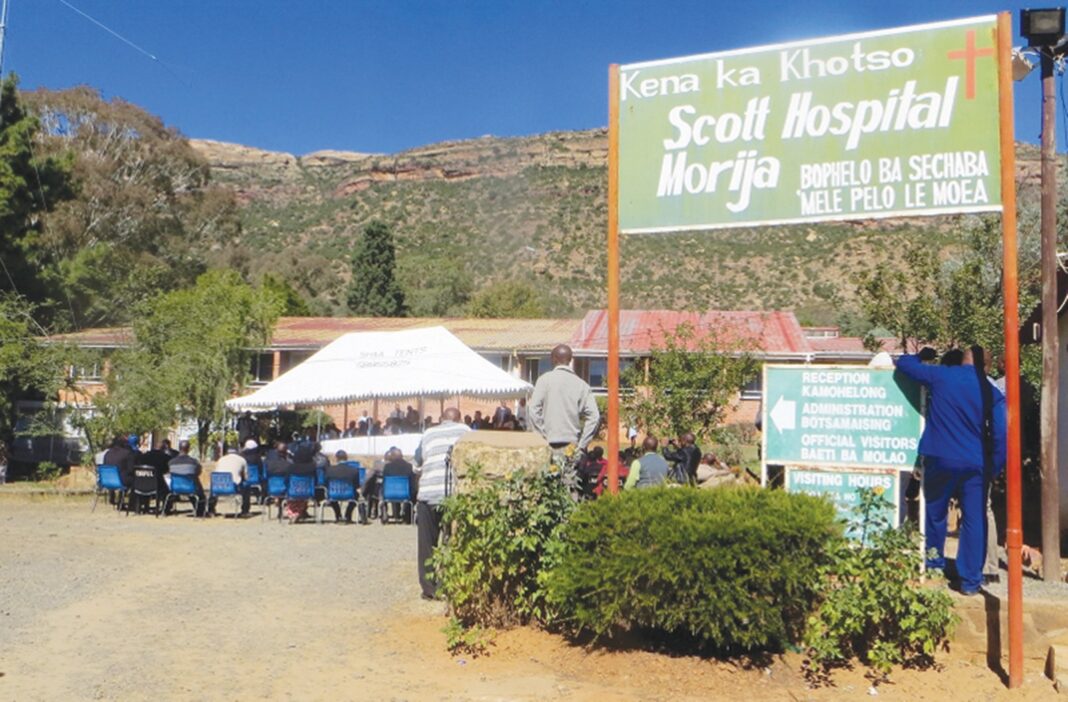By Neo Kolane and Seleoe Nonyane
All hospitals and health centres throughout Lesotho that belong to the Christian Health Association of Lesotho (CHAL) will from next year introduce a standardised system for their health services, it has emerged.
An introduction of the standardised system will showcase a list of services which indicate amounts to be paid for health care with only one service spared a charge.
CHAL is a voluntary health services organisation of six member churches comprising of The Anglican Church in Lesotho, The Assemblies of God, Lesotho Evangelical Church in Southern Africa, The Roman Catholic Church, The Seventh Day Adventist Church of Southern Africa and The Bible Covenant Church.
The association was registered in Lesotho in 1974 under the Societies Act. CHAL currently provides about 40 percent of health care in Lesotho and is a key partner of the government of Lesotho in the health sector. The member churches own eight hospitals and 71 health centres throughout Lesotho.
CHAL It has been in partnership with the government of Lesotho for over 10 years and it is guided by a Memorandum of Understanding (MOU) whereby CHAL provides services to Basotho freely at health centres and at highly subsidised fees at hospitals in return for a subvention from the government.
The advocacy and communications officer of CHAL Lebohang Liphapang this week said the procedure of the system for the services is still being scrutinised for it to be implemented so that it can be standardised in the long run.
She said as of now, clinics under CHAL are charging patients depending on the services provided looking at the amount which can sustain a particular service.
She said CHAL hospitals have their own board members that have to coordinate their clinics under the watchful eye of the association, giving powers to the board members and management to decide on a particular amount of fee to be charged for particular services.
She disclosed that the amount charged at hospitals started from M15 just like in government hospitals while clinics rendered free services. But that is set to change from next year adding that a decision was yet to be made on certain services which will be excluded from being charged.
She explained that the management of CHAL’s facilities should have put notice boards or made announcements publicly regarding the changes to be made.
“When it comes to clinics and hospitals under CHAL, the matter on their sustainability is still on the table on how it will be worked on but it is clear that the bottom line is that a private wing will be introduced in clinics.
“There will be two queues; people who can afford services privately will get their treat, and patients who cannot afford their services will also get them but in the meantime, the private wing will introduce a system or a clear policy as to how it will be facilitated because for now, it is just an idea.
“The government has tabled that issue to us, so it is for CHAL to sit down and figure how policies are made around it so that it becomes a success,” she explained.
She said the money is used for patients to receive services at health facilities adding that it is already subsidised by the government hence CHAL claims more than the M15 fee.
“As much as people pay M15, we as CHAL need to make sure that the services patients receive at health facilities whether at government hospitals or CHAL, fetch more than the M15.
“An amount of M15 is a subsided cost which the government decided upon to meet its people halfway but as of now the government is at a position where they are unable to sustain that matter.
“Some clinics of CHAL are already charging their patients more than M15 for the services, because some of the clinics were at a stage where they could shut down; some clinics made money to pay the employees only leaving aside electricity and water utilities, so CHAL had to find a quick solution.
“Hence CHAL wanted to start the standardised system as soon as possible,” Liphapang said.
She stressed that the problem is caused by a delay in the disbursement of the subvention from the ministry of health explaining that when the money is disbursed it is not offered in one phase. That, she noted, means all operations at the facilities are acutely affected including medication and staff monthly salaries.
The human resource officer at Maluti Adventist Hospital Moroesi Kokome confirmed with theReporter this week that the hospital started in November to charge an extra amount of money for them to be offered health services.
Kokome said that notices were given to its patients to make them aware that due to the problem they encounter, as there is no enough money to cater for staff salaries and utilities such as water and electricity and other required equipment to provide satisfactory health care.
“It is painful to see employees who are sick go to demand services from the hospitals they work at being returned and referred to go buy medications at the pharmacies.
“We are trying to ensure that patients are not turned away while seeking services. Some matters are so necessary that they need to be given much attention. Children pay M50 while adults pay M100,” she said.
Commenting on the issue, the ministry of health’s public relations manager, ‘Mamolise Falatsa has declined any knowledge about the new CHAL planned arrangement.
She sought to know the type of services that are to be offered for free and those that will be paid for.
Falatsa mentioned that the ministry of health and CHAL have signed an MOU that stipulates that CHAL hospitals and health care centres will offer free services to its clients.
“So, the news that CHAL has decided to make changes regarding their services is new to the ministry,” she said adding that CHAL and the government were yet to hold talks to discuss the MOU..
The ministry of health’s public relations officer ‘Mateboho Mosebekoa said the ministry is clueless on the decisions intended by CHAL.
But she admitted that CHAL was at liberty to introduce its own plans without consulting the ministry due to the fact that it is an independent organisation and the ministry only comes through with the subvention.









